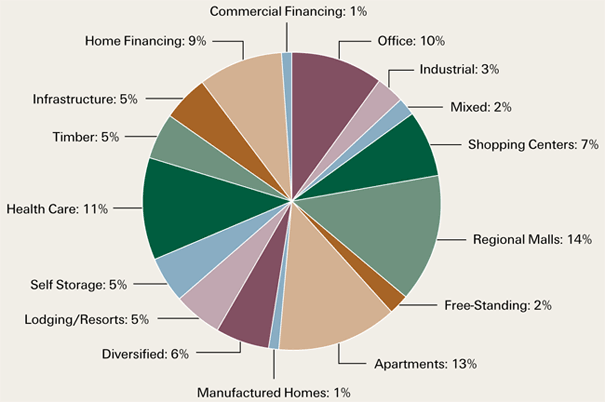Asset Allocation Investing In Real Estate Through REITs
Post on: 29 Март, 2015 No Comment

When deciding on your portfolios asset allocation, another option beyond broad stock funds in domestic or international markets is to invest in is real estate. Besides directly owning a home or office complex, an easy way to get exposure is to own Real Estate Investment Trusts, or REITs.
What is an REIT?
From the National Association of REITs website:
A REIT is a company that owns, and in most cases, operates income-producing real estate such as apartments, shopping centers, offices, hotels and warehouses. Some REITs also engage in financing real estate. The shares of many REITs are freely traded, usually on a major stock exchange.
To qualify as a REIT, a company must distribute at least 90 percent of its taxable income to its shareholders annually. A company that qualifies as a REIT is permitted to deduct dividends paid to its shareholders from its corporate taxable income. As a result, most REITs remit at least 100 percent of their taxable income to their shareholders and therefore owe no corporate tax.
Since the REIT income essentially passes through directly to the shareholders, you are getting relatively direct exposure to commercial real estate. Youre not investing in a builder, or some other funky derivative. There are both domestic and international REITs, but lots of the following is based on US REITs.
Characteristics of REITs
Long-term historical data for REITs are not directly available, as there was not necessarily a consistent index to track them, or actual broad mutual funds investing in them. Ive read various estimates from varying companies and academic studies via different books for returns (annualized).
- From All About Asset Allocation for 1930-2004: US REITs returned 9.3% vs. 9.7% for the Total US Stock Market.
- From Intelligent Asset Allocator for 1970-1998: US REITs returned 13% vs. 13.5% for the S&P 500.
- From Unconventional Success for 1978-2003: US REITs returned 12% vs. 13.5% for the S&P 500.
To generalize, the performance of REITs is a little less than that of broad stock indexes, but higher than the return from bonds.
However, the main reason why many investment professionals and institutions all invest in REITs is that they have a historically low correlation with the overall stock markets, and also the bond market. This diversification benefit allows you to incorporate Modern Portfolio Theory and try to construct a portfolio with a better return/risk ratio than you had previously.
Below is a graph comparing historical risk/return relationships between various portfolios with a market weight of REITs (the amount already contained in total market index) and one with an additional 10% allocation to REITs. It is taken from a helpful Vanguard research paper on REITs.
As you can see, adding a bit of REITs boosted returns for each portfolio data point, while actually reducing volatility. Again, this is historical information, youll have to decide if you think such behavior will persist.
REITs also historically have a high correlation with inflation, so many believe them to be a good inflation hedge. There are a couple of explanations for this. For one, most of the income for REITs is from rent payments, which usually move in line with inflation. (They raise the rent!) Also buildings are made from raw materials like wood and steel, so a buildings replacement costs also move with inflation.
So How Much REITs Should I Own?
As hinted above, a publicly-traded REIT is simply a stock. So if you own a broad index fund, you already own some REITs according to their market weight. Per this Diehards post by CyberBob, REITs make up
2.5% of a US Total Stock market fund and over 12% of Vanguards Small Cap Value index fund. So you might not even want to add any more.
I would recommend taking a look at my Comparison of 8 Model Asset Allocations. which includes several Real Estate allocation suggestions from various sources. Youll see most are around 10-15% of equities, although they do vary from just the market weight of about 2-3% to as high as 29%.
Note that REITs are very tax-inefficient. Most of the returns are via unqualified dividends, which dont get the lower dividend rate and are instead taxed at your ordinary marginal rate. As such, they should get kept within tax-deferred accounts like IRAs whenever possible.
My Decision
Ive already shared that I am going to have 10% of my overall equity allocation in US REITs. That ends up being 8.6% of my entire portfolio (Im 86% stocks/14% bonds), but if you add up the exposure already built in my Total US or Small Value funds, Im closer to 10% in total. From my readings, I feel that this a reasonable allocation to add some diversification to my portfolio. Specifically, I hold the Vanguard REIT Index Fund (VGSIX) within my IRAs.
I believe that commercial real estate will continue to have decent returns in the long run, even though it is prone to wild fluctuations in the short run. Im happy to dollar-cost-average through it all. In addition, I think the relatively low correlation with stocks and high correlation with inflation will persist due to the inherent unique characteristics of the sector. I will probably add international REITs in the future, as costs go down and there are better investments options which index this area.
But thats just me, and this is just a quick summary of what Ive come across. Hopefully the references and resources listed here can help others make their own informed decisions.














